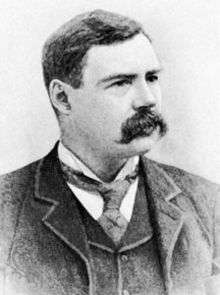Harold Frederic

Harold Frederic (born Harold Henry Frederick; August 19, 1856 – October 19, 1898)[1] was an American journalist and novelist.
Life and career
Frederic was born in Utica, New York, to Presbyterian parents. After his father was killed in a railroad accident when Frederic was 18 months old, the boy was raised primarily by his mother. He finished school at age fifteen, and soon began work as a photographer. For four years he was a photographic touch-up artist in his hometown and in Boston. In 1875, he began work as a proofreader for the newspaper The Utica Herald and then The Utica Daily Observer. Frederic later became a reporter. Frederic married Grace Green Williams in 1877, and they had five children together. By 1882 he was editor of the newspaper The Albany Evening Journal in the state capital.
In 1884 Frederic went to live in England as London correspondent of the New York Times, and worked at this position for the rest of his life. He brought his family to London by 1889. Afterward he met Kate Lyon, who became his mistress. Frederic and Lyon established a second household, living openly together; and they had three illegitimate children.
Frederic wrote several early stories, but it was not until he published Illumination (1896), better known by its American title, The Damnation of Theron Ware, followed by Gloria Mundi (1898), that his talent as a novelist was fully realized. Critic Jonathan Yardley called Damnation "a minor classic of realism".[2]
Kate Lyon was a Christian Scientist. Frederic suffered a stroke in 1898. After his death, she was tried on charges of manslaughter brought by his wife Grace Frederic, and acquitted at trial.
Burial
Harold Frederic's remains were returned to the United States and he was interred in Forest Hill Cemetery in Utica, New York.
Works
Novels
- (1887). Seth's Brother's Wife. New York, London.
- (1890). The Lawton Girl. Charles Scribner's Sons, New York.
- (1890). In the Valley, a story of 1777. New York, London.
- (1892). The Return of the O'Mahoney. G. W. Dillingham Co., New York. London, 1893.
- (1893). The Copperhead, Charles Scribner's Sons. New York.
- (1896). Marsena. London.
- (1896). The Damnation of Theron Ware, Stone & Kimball, New York. Also called Illumination. London, Leipzig 1896 [Belknap Press of Harvard University Press, 1960].
- (1896). March Hares. London.
- (1898). Gloria Mundi. Chicago, New York, London.
- (1899). The Market Place. New York, London.
Collections
- (1894). 'The Copperhead' and Other Stories of the North During the American War. London.
- (1894). 'Marsena' and Other Stories of the Wartime. New York.
- (1896). Mrs. Albert Grundy: Observations in Philistia. London, New York.
- (1897). In the Sixties.
- (1898). 'The Deserter' and Other Stories: A Book of Two Wars. Lothrop Publishing Company, Boston.
- (1966). Harold Frederic's Stories of York State.
- (2015). The Martyrdom of Maev and Other Irish Stories. Washington D.C.:The Catholic University of America Press.
Non-Fiction
- (1891). The Young Emperor William II of Germany: A Study in Character Development on a Throne. G. P. Putnam's Sons, New York.
- (1892). The New Exodus: A Study of Israel in Russia. New York, London.
Notes
- ↑ Bennett, Bridget (1997). The Damnation of Harold Frederic. Syracuse, NY: Syracuse University Press. p. xix. ISBN 0-8156-0390-8.
- ↑ Yardley, Jonathan. (November 27, 2006.) "In 'Theron Ware,' Realism Wears Well", The Washington Post. Retrieved on February 22, 2010.
References


Further reading
- Cargill, Oscar (1933). The Social Revolt. American Literature from 1888 to 1914, The Macmillan Company.
- Gatta, John (1997). American Madonna: Images of the Divine Woman in Literary Culture, Oxford University Press.
- Hind, C. Lewis (1922). "Harold Frederic." In More Authors and I, Dodd, Mead and Company.
- O'Donnell, Thomas Francis (1961). Harold Frederic, Twayne Publishers.
- Payne, William Morton (1902). "Harold Frederic." In Editorial Echoes, A. C. McClurg & Co.
- Wilson, Edmund (1973). The Devils and Canon Barham, Farrar, Straus and Giroux.
External links
| Wikisource has original works written by or about: Harold Frederic |
| Wikimedia Commons has media related to Harold Frederic. |
- Works by Harold Frederic at Project Gutenberg
- Works by or about Harold Frederic at Internet Archive
- Works by Harold Frederic at LibriVox (public domain audiobooks)

- Works by Harold Frederic, at Unz.org
- Harold Frederic's The Damnation of Theron Ware (biography, bibliography etc.)